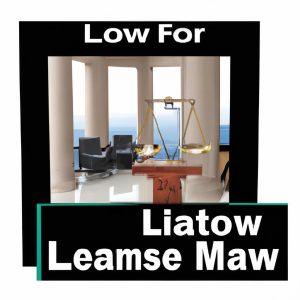As trusted legal advisors in matters of estate planning and asset protection, questions surrounding the tax implications of trusts often arise. In this article, we will delve into the complexities of whether money from a trust is taxable. Drawing upon our expertise at Morgan Legal Group, based in the heart of New York City, we will discuss the various factors that may impact the taxability of trust funds and provide clarity on this intricate issue.
Understanding the Tax Implications of Trust Income
Is crucial for individuals looking to maximize their wealth and assets. When it comes to trust income, the question of whether or not it is taxable depends on various factors, such as the type of trust, the source of income, and the distribution rules.
-
- Revocable trust: Income from a revocable trust is typically treated as taxable income to the grantor, meaning the individual who created the trust.
-
- Irrevocable trust: Income from an irrevocable trust may be taxable to either the trust itself or the beneficiaries, depending on the nature of the income and the trust’s distribution provisions.
It is essential to consult with a knowledgeable estate planning attorney to understand the specific tax implications of trust income based on your unique circumstances.
Key Factors that Determine Taxability of Trust Distributions
One key factor that determines the taxability of trust distributions is the type of trust itself. There are two main categories of trusts: revocable trusts and irrevocable trusts. Revocable trusts, also known as living trusts, are usually not subject to income tax as the income is typically reported on the grantor’s individual tax return. On the other hand, irrevocable trusts are considered separate tax entities, and any income generated within the trust is subject to taxation.
Another important factor to consider is the source of the trust income. Trust distributions can come from a variety of sources, including interest, dividends, capital gains, and rental income. Each of these types of income may be taxed differently, so it is essential to understand the specific tax implications of each source. Additionally, distributions from the trust must be classified as either simple or complex in order to determine their taxability. Simple trust distributions are required to be distributed to beneficiaries each year and are taxed at the beneficiary’s individual tax rate. Complex trust distributions, on the other hand, have more flexibility in distribution and are taxed at the trust’s tax rate.
Strategies to Minimize Tax Liability on Trust Income
When it comes to trust income, it is important to understand the tax implications involved. Trust income is generally taxable, but there are ways to minimize tax liability. Here are some strategies to consider:
-
- Distribute income to beneficiaries: By distributing income to beneficiaries, the tax burden shifts from the trust to the individual beneficiaries who may be in a lower tax bracket.
-
- Utilize tax-exempt investments: Investing in tax-exempt securities or municipal bonds can reduce the amount of taxable income generated by the trust.
Consulting a Trusts and Estates Attorney for Personalized Tax Advice
When considering whether money from a trust is taxable, it is essential to consult with a trusts and estates attorney for personalized tax advice. Trusts can be a valuable tool for managing and distributing assets, but the tax implications can vary depending on the type of trust and the specific circumstances involved.
In general, money from a trust may be subject to taxation in the following ways:
-
- Income Tax: Income generated by the assets held in a trust may be subject to income tax. It is crucial to understand the tax implications of any income generated by the trust and how it will be reported on your tax return.
-
- Estate Tax: Depending on the size of the trust and the estate tax laws in your state, money from a trust may be subject to estate tax upon your passing. Proper estate planning can help minimize the tax burden for your beneficiaries.
-
- Gift Tax: If you receive money from a trust as a gift, it may be subject to gift tax depending on the amount and the relationship between the donor and the recipient. Consulting with a trusts and estates attorney can help you navigate the complex tax laws surrounding trusts and ensure that you are in compliance with all applicable tax requirements.
| Income Tax | Estate Tax |
|---|---|
| Income generated by assets subject to tax | Subject to estate tax at passing |
Q&A
Q: Is money from a trust taxable?
A: The taxation of trust funds can be a complex issue, as it depends on various factors such as the type of trust, the source of the income, and the distributions made to beneficiaries.
Q: What types of trusts are subject to taxation?
A: Generally, irrevocable trusts are subject to taxation, while revocable trusts are not. However, there are exceptions, so it is best to consult with a tax professional for specific advice.
Q: Are there any ways to minimize taxes on trust funds?
A: Yes, there are strategies that can help reduce the tax burden on trust funds, such as distributing income to beneficiaries in lower tax brackets or using tax-efficient investment strategies.
Q: Are distributions from a trust taxable to beneficiaries?
A: Yes, distributions from a trust may be taxable to beneficiaries, depending on the nature of the income and the terms of the trust. It is important for beneficiaries to be aware of the tax implications of any distributions they receive.
Q: What should someone do if they have questions about the taxation of trust funds?
A: If you have questions about the taxation of trust funds, it is advisable to seek advice from a tax professional or financial advisor who is familiar with trust taxation laws. They can provide guidance based on your specific situation and help ensure compliance with tax laws.
To Conclude
In conclusion, navigating the tax implications of money from a trust can be a complex and nuanced process. It is important to consult with a financial advisor or tax professional to ensure that you are adhering to the proper regulations and maximizing the benefits of your trust. Remember, proper planning and understanding the rules can help you make the most of your trust funds while minimizing any tax burdens. Trust in the experts to guide you through the process and protect your financial future.
In today’s fast-paced and ever-changing world, financial planning and management have become essential for individuals and families alike. One of the most common methods of estate planning is creating a trust. A trust is a legal arrangement where trustees hold and manage assets on behalf of beneficiaries. Trusts can be highly beneficial in ensuring the efficient distribution of assets and wealth to beneficiaries, even after the creator’s death. However, one crucial aspect that often confuses people is the tax implications of receiving money from a trust. Is money from a trust taxable? In this article, we will explore this question in detail and provide you with a thorough understanding of the subject.
The short answer is yes. Money from a trust can be taxable. However, the taxation of trust distributions depends on various factors, including the type of trust, the source of the funds, and the purpose of the distributions. Let’s examine each of these factors to better understand the taxability of money from a trust.
1. Type of Trust:
There are several types of trusts, each with its unique tax implications. The three most common types of trusts are revocable, irrevocable, and living trusts. A revocable trust allows the creator to modify or revoke the trust at any time during their lifetime. Money from revocable trusts is not taxable as the creator retains control over the assets.
On the other hand, an irrevocable trust cannot be altered or terminated once created. In most cases, money distributed from an irrevocable trust is taxable to the extent of the trust’s income. However, certain exceptions may apply, and it is best to consult a tax professional for a comprehensive understanding of your specific situation.
Living trusts, also known as inter vivos trusts, are established during the creator’s lifetime and can be either revocable or irrevocable. In the case of revocable living trusts, the distributions are not taxable as the creator retains control over the assets. However, distributions from an irrevocable living trust are taxable to the beneficiary, as they are considered a form of income.
2. Source of Funds:
The source of funds in a trust also plays a significant role in determining its taxability. The two primary sources of funds in a trust are income and principal. Income refers to the profits earned from investments, such as interest, dividends, and rental income. Principal, on the other hand, is the initial amount of money placed in the trust by the creator.
Generally, income distributions from a trust are taxable, while principal distributions are not. However, certain exceptions may apply, and it is crucial to review the trust document and consult a tax professional for a clear understanding of your tax obligations.
3. Purpose of Distributions:
Another crucial factor that determines the taxability of money from a trust is the purpose of the distributions. The distributions may be tax-free if the trust’s purpose is to provide for a beneficiary’s education, medical expenses, or other qualifying expenses. However, if the distributions are made for non-qualifying purposes, such as leisure or luxury expenses, they may be subject to taxation.
To determine the tax implications correctly, it is essential to review the trust document carefully and understand the intended purpose of distributions. It is best to consult a tax professional for guidance if you are uncertain or unclear about the trust’s purpose or tax implications.
Benefits of Trusts:
While the tax implications of receiving money from a trust may seem complex, trusts provide several benefits that far outweigh any potential tax liability. Some of the benefits of establishing a trust include:
1. Avoiding Probate:
Probate is the legal process of administering a person’s estate after their death. It can be a lengthy and costly process, with court and legal fees potentially eroding a significant portion of the estate. Trusts, on the other hand, do not go through probate, providing a quicker, more cost-effective way of transferring assets to beneficiaries.
2. Protection against Creditors:
Assets held in a trust are protected against creditors in case of financial difficulties or a lawsuit. This protection is especially vital for high-net-worth individuals who want to safeguard their wealth for future generations.
3. Control over Assets:
By creating a trust, the creator can designate how and when the assets will be distributed to beneficiaries. This allows for greater control and management of the assets, even after the creator’s death.
Practical Tips:
If you are considering creating a trust, here are a few essential tips to keep in mind to make the process smoother and ensure tax-efficient distributions:
1. Consult a professional: Trusts are complex legal and financial arrangements that require the guidance of a professional. It is always advisable to consult a financial advisor and a tax professional to understand your options and make the best decisions.
2. Review and update your trust regularly: Life is constantly changing, and it is essential to review and update your trust regularly to ensure it aligns with your current financial and personal situation.
3. Keep accurate records: It is crucial to keep detailed and organized records of all trust transactions and distributions for tax purposes. This will also make it easier for your beneficiaries to manage the trust after your death.
In conclusion, while money from a trust can be taxable, various factors determine its tax implications. To determine the taxability correctly, it is crucial to understand the type of trust, the source of funds, and the purpose of distributions. Trusts provide various benefits, such as avoiding probate and protecting assets, making them a valuable tool in estate planning. As with any financial arrangement, it is crucial to consult professionals and keep accurate records to ensure tax-efficient and smooth management of the trust.





